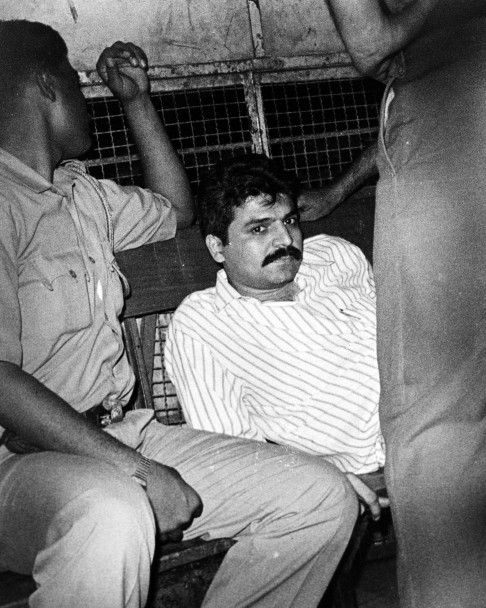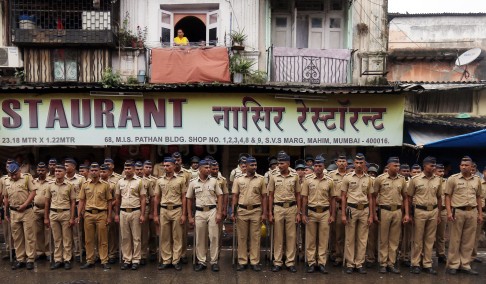India hangs 1993 Mumbai bomb blasts plotter Yakub Memon on his birthday
PUBLISHED : Thursday, 30 July, 2015, 3:40pm
UPDATED : Thursday, 30 July, 2015, 3:40pm
Associated Press in New Delhi

Indian protesters shout slogans during a protest against the death sentence of convicted bomb plotter Yakub Memon, a key plotter of the bomb attacks which killed hundreds in Mumbai in 1993, in New Delhi. Photo: AFP
Yakub Abdul Razak Memon, the only death row convict in India’s deadliest terror attack, the 1993 Mumbai bombings that killed 257 people, was hanged Thursday on his birthday after the country’s president rejected a last-minute mercy plea.
Memon was executed inside a prison in western India where he had been incarcerated since 1994.
An accountant, Memon was convicted in 2007 of helping raise funds for the serial blasts that rocked the financial capital. By late Wednesday Memon finally exhausted all the legal avenues open to him in order to escape the death penalty.
Yakub’s older brother Ibrahim, or “Tiger,” Memon and Dawood Ibrahim, both leading gangsters in Mumbai in the 1990s, are the main suspects in the bombings, seen as revenge for the destruction of a 16th century mosque by Hindu nationalists. Both have fled the country.
Prominent citizens, including retired Supreme Court judges, had urged President Pranab Mukerjee to commute Memon’s sentence to life in prison. That appeal reflected both opposition to the death penalty as well as fresh claims by his lawyers that he freely surrendered to Indian authorities in Kathmandu, Nepal, and that his direct links to the bombings had not been sufficiently established.
Indian investigators, along with the main public prosecutor in the case, Ujjwal Nikam, say he was arrested in New Delhi.

Yakub Abdul Razak Memon in 1993: Photo: Mahendra Parikh/Indian Express Archive via AP
The hanging, carried out on Memon’s 53rd birthday, came after a day of dramatic last-ditch efforts by his legal team to commute or at least delay his sentence. Just two hours before the sentence was carried out India’s Supreme Court had been hearing arguments by his lawyers.
“I have exhausted my remedies,” lawyer Anand Grover said in New Delhi at dawn after the Supreme Court heard Memon’s final plea. “I only hope that Yakub Memon will have a dignified death.”
“There’s no question of victory. I’ve just done my job,” said Attorney General Mukul Rohtagi.
The March 12, 1993, bombings ripped through the country’s financial heart, and targeted some of the city’s key centers — the Bombay Stock Exchange, Air India offices, a state transport office, three hotels, a gas station and a movie theater.
The bombs, packed into cars, scooters, under a manhole cover and in a hotel room, were detonated over two hours in the afternoon.
The blasts were seen as revenge for the demolition of a medieval mosque in northern India by Hindu nationalists. The mosque’s demolition sparked religious riots in many parts of the country, leaving more than 800 people dead, most of them Muslims.
It was one of India’s lengthiest court trials, with 686 witnesses giving testimony that filled 13,000 pages. The trial began June 6, 1995, and hearings ended in January 2003. The judgments finally began to come in late 2006.
The accused included gangsters, housewives and a Bollywood movie star. A total of 100 people have been convicted of involvement in the blasts. Ten of those were also sentenced to death but had their death sentences commuted to life in prison.
As Mumbai woke up to the news of the hanging, scores of police gathered near the Memon family home and cordoned off the area. His wife and daughter were believed to be at the family home.

Indian policemen stand guard near the residence of Yakub Memon's family in Mumbai. Photo: EPA
Police were also stationed at the various places in the city where the bombs had exploded.
Human rights groups, including Amnesty International, have decried the hanging.
India’s legal system allows for executions in what the Supreme Court calls “the rarest of the rare cases.” But there are debates on how to define that and the only executions in recent years have been of convicted terrorists. The vast majority of the 100-150 death sentences handed down each year are eventually commuted to life in prison.
For nearly a decade, India had an unofficial moratorium on executions. That ended in November 2012 with the execution of Mohammed Ajmal Kasab, the lone surviving gunman in the 2008 Mumbai terror attacks. Two months later, Mohammad Afzal Guru, a Kashmiri convicted in a deadly 2001 attack on India’s Parliament complex, was hanged. Both executions were done secretly and the bodies were buried inside prison compounds.
